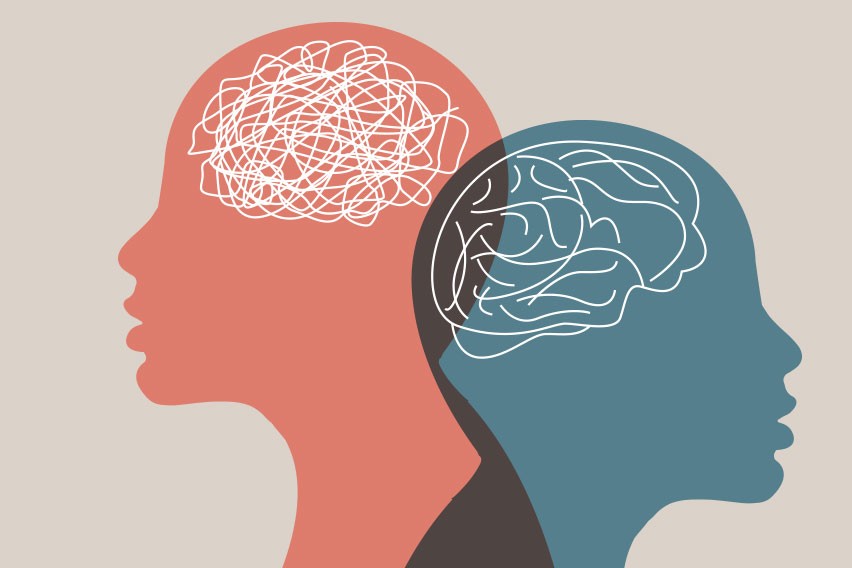Dual diagnosis is when a person has both substance use disorder and a secondary mental health issue at the same time. A person’s secondary mental health condition might be post-traumatic stress disorder, general anxiety disorder, schizophrenia, or bipolar disorder. With dual diagnosis, treating both problems at once sets the stage for long-term success in recovery.
Many people with mental health issues use alcohol or drugs as a way to self-treat their symptoms. Getting intoxicated or high can initially make the symptoms of mental illness feel better. People frequently use alcohol or drugs to alleviate stress, anxiety, or depression.
Unfortunately, substance abuse causes chemical changes in the brain and body that can gradually make the symptoms of an existing mental health disorder far worse. Depression and anxiety often intensify, and more drugs and alcohol are often needed just to feel “normal”. Sometimes, the chemical changes that substance abuse creates throughout the brain and body set the stage for the development of mental health issues, even when none existed before.
People who never suffered from depression or anxiety in the past may find themselves dealing with these or other mental health challenges as the result of their addictions. In either case, the best form of addiction treatment will address the full range of mental health issues that the individual is experiencing.
What Is Dual Diagnosis?
Dual diagnosis is frequently referred to as having a co-occurring mental health disorder. Before receiving addiction treatment, most people don’t view drug or alcohol addiction as a disease. In fact, many addicts and their loved one perceive addiction as a matter of self-choice, a battle of personal will, or even a personal shortcoming.
In reality, addiction is a complex, lifelong disease that affects the brain, the brain’s chemistry, and a person’s entire physiology. As such, in rehab centers throughout the world, addiction is referred to as either alcohol use disorder or substance use disorder, and it is classified as a mental health issue.
Recognizing addiction as a mental health issue often means that addiction treatment is a covered service under many private pay and subsidized health insurance plans. Moreover, even though addiction cannot be cured, when it is addressed as a mental health disorder, it can be successfully managed.
Studies show that the “addiction as a disease” model promotes the highest levels of success in recovery. By tackling recovery with the mindset of needing long-term life changes, and ongoing mitigation strategies, many people are able to achieve sobriety and maintain it indefinitely.
Dual diagnosis helps patients and rehab professionals understand both the underlying causes of individual addictions and the effects that ongoing drug or alcohol use has on individual health. When people use drugs or alcohol to alleviate the symptoms of mental health conditions that have not been diagnosed or treated, dual diagnosis treatment can effectively eliminate the need to use.
People can enjoy greater mood balance and improved all-around mental health without relying on alcohol or illicit substances. These same benefits can also be experienced by patients for whom co-occurring disorders may be the direct result of heavy or prolonged substance use.
Why Do Addiction and Mental Health Disorders Happen Together?
Alcohol and drugs affect the central nervous system by triggering its reward center. The brain’s reward center produces and releases “feel good” chemicals in response to positive, healthy activities. For instance, these chemicals or neurotransmitters are often released after:
- Challenging physical workouts
- Impressive personal or professional accomplishments
- Engaging in positive social interactions with others
When functioning normally and free of drugs or alcohol, the brain’s reward center encourages beneficial behaviors and promotes high levels of motivation. People tend to return to positive activities when they feel good both during and after completing them.
When drugs or alcohol are used, “feel good” chemicals are released in massive surges. More importantly, there is no beneficial activity that’s being rewarded. This causes the brain to consider drug and alcohol use as good or beneficial behavior. For people with underlying mental health issues, this change in reward system functioning can be especially detrimental.
Many people with underlying mental health issues are already dealing with chemical imbalances within the brain. Most are also desperately seeking some accessible form of relief. Whether drinking alcohol or taking drugs, these individuals recognize that they feel noticeably better when high.
Many people with mental health disorders never have their issues examined, diagnosed, or properly treated. As such, alcohol and drug use often appear to be the best way for these individuals to achieve feelings of normalcy, and to improve their life qualities. Unfortunately, the perceived benefits of substance use are usually very short-lived. Continued changes in brain chemistry can actually make existing mental health issues far worse than they were before self-medicating.
Chemical changes that occur throughout the brain as a consequence of repeated drug and alcohol use can also cause mental health issues to develop. Heavy drug and alcohol users frequently contend with severe depression, severe anxiety, and other overwhelming symptoms. Although drugs and alcohol are the ultimate cause of their discomfort, they often continue using the very same substances in an effort to alleviate their increasing pain.
What Conditions are Considered in Dual Diagnosis?
Many mental health issues can be both caused by and exacerbated by substance abuse. At Recovery Bay Center, we take a thoughtful and needs-specific approach with each dual diagnosis client we treat. Among some of the dual diagnosis conditions that we consider are:
- Post-traumatic stress disorder
- Panic disorder
- General anxiety disorder
- Obsessive compulsive disorder
- Bipolar disorder
- Borderline personality disorder and other personality disorders
- Schizophrenia
- Attention deficit hyperactivity disorder
Certain mental health issues are commonly paired with specific forms of substance abuse. For instance, people who constantly feel anxious, nervous, and hyperactive may use stimulants to calm themselves down. People who deal with chronic anxiety often rely on benzodiazepine drugs to promote the feelings of relaxation and euphoria they seek. During our dual diagnosis treatment, we carefully consider a person’s history of substance abuse, the substance of choice, symptoms, and many other factors before offering diagnosis and treatment. After this assessment, every patient will receive an individualized treatment plan.
Treating Dual Diagnosis
Dual diagnosis treatment can be provided in a vast range of ways. The overarching goal of these efforts is to address and alleviate the symptoms of both problems at once. When mental health disorders arise as the result of heavy and prolonged substance use, many people experience tremendous improvements in their mental well-being after completing our supervised detox program and starting our inpatient treatment.
We take a holistic approach to treating our clients so that healthy living habits and stress management techniques are learned. Reliance upon medications is minimized when possible as well. In some instances, ongoing medical management of mental health issues is required for long-term success in recovery. When this is the case, we carefully explain the available range of treatment options. This discussion assists our clients in establishing sustainable, manageable plans for the long-term treatment of their disorders.
Embracing dual diagnosis treatment within the setting of a men’s addiction recovery campus yields a remarkable sense of empowerment and ultimate fulfillment. The journey towards recovery becomes more profound and transformative as individuals are equipped to conquer both addiction and co-occurring mental health challenges. At our renowned men’s addiction recovery campus, we have witnessed countless success stories where individuals have not only overcome their addictions but also achieved lasting mood balance and significantly improved mental well-being.
The concept of dual diagnosis treatment at a men’s addiction recovery campus encompasses a holistic approach that recognizes the intricate relationship between substance abuse and mental health. This unique setting provides an environment tailored to men’s needs, addressing the multifaceted aspects of their addiction and mental health concerns. Our dedicated team of professionals understands the nuances of these challenges and is committed to guiding individuals towards comprehensive healing and recovery.
Through evidence-based therapies, counseling sessions, and a supportive community, our men’s addiction recovery campus becomes a sanctuary of transformation. The journey towards lasting mood balance and improved mental health is illuminated through personalized treatment plans that target the underlying causes of addiction and co-occurring conditions. By offering a safe space for exploration and healing, individuals are empowered to confront past traumas, challenge negative thought patterns, and develop effective coping mechanisms.
The rewarding outcomes of dual diagnosis treatment at a men’s addiction recovery campus extend far beyond the campus itself. As individuals embark on the path of recovery, they are equipped with the tools to navigate life’s challenges with resilience and a newfound sense of emotional stability. By addressing both addiction and mental health, individuals not only achieve sobriety but also experience a profound improvement in their overall quality of life. To find out more about our rehab services and mental health support, call us today.






